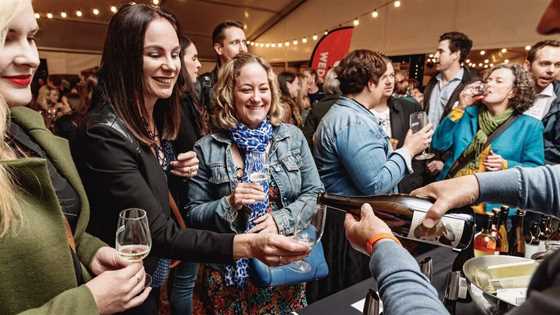Helping out ain’t just about dropping a few dollars in a donation jar anymore. Innovative organisations are disguising do-gooding behind selling your morning coffee or decorating your home – we love the tricks, but also the hard-working souls behind them. There’s a lot of passion and grit in the games, too.
Upside Nepal
A local NGO is growing Nepal's next crop of entrepreneurs.
Just south of the Tibetan border lies Ghiling, a Nepalese village in the foothills of the Himalayas. It's a two-day ride on horseback from Jomsom, the region's capital, there's no electricity, and villagers rely on subsistence farming to survive. It's also the place where Perth-based development organisation Upside Nepal has chosen to fund an apple orchard, which grows on eight hectares of unused community land. Founder Cal Fouler says they're interested in the power of agribusiness, where farmers grow a surplus and sell the stockpile for profit, which can fund education opportunities for the kids of Ghiling. "The goal with the orchard is to eventually walk away and have it be self-sustaining," says Rory Gollow, who managed Upside in 2014. "Nepal suffers from brain drain, where the top kids get scholarships, and if you're training to be a doctor or a lawyer you're not going to go back to your village and start farming rice. They go abroad and seek other opportunities."

Project leader Tenzin at the site of the orchard that will be the core of the town's agribusiness.
Cal adds that a huge part of Nepal's GDP comes from remittance – the money these people send home – and another significant chunk comes from foreign aid. There's clearly a need, and Upside is addressing it by creating aspirational business opportunities for young villagers. "You need educated kids to run the orchard, and you can't run the school without the funds from the business," Rory explains. "We're creating an economy in Ghiling again." But, Cal is quick to add, it's not Upside's model to do it all themselves. "A big part of what we do is collaboration," he says. Upside partnered with Maitri Ratna, a Nepalese NGO, to first build the school, and then plant the orchard to ensure a sustainable revenue stream for keeping the school working. "We see opportunity in Nepal, and we just provide training and resources for these people to create change," says Cal.
.jpg)
The children of Ghiling are being educated with a view to one day running the orchard.
Profectus
Got a great idea but nowhere to take it? Try this entrepreneur hub.
Attending an awards night as deputy CEO of a not-for-profit, and one of a handful of young people present, Mark Shelton saw that while he was learning a lot from his role, not many people his age were in the same position. "I found it quite sad!" he admits. "The young have really awesome ideas, and more people should be working on supporting them." Not one to let a problem sit, he recruited two friends to form Profectus, an incubator for Perth's young entrepreneurs. Profectus provides mentoring, workshops series and a physical space for co-working – the Innovation Hub – to nurture innovation in WA. And they're well on the way, with recent news that Hub group J Bay scored first prize in innovation competition Unearthed, a marathon 54-hour 'hackathon' that saw teams compete to solve a problem from mining giant Iluka Resources. J Bay developed technology that scans the entire Australian coastline in less than a minute to find titanium – and they're now using the tech with Iluka. Says Mark, that's just the kind of spirit Profectus is trying to nurture. "We'd like to change the core of the WA economy to become entrepreneurship and innovation."

Photography James McCarthy-Price
First Home Project
These home owners opened their doors to Australia's new arrivals.
There's a 19-year-old guy in Midland, who late last year, got his L plates. That fact alone is more likely to inspire fear than pride, but for one key detail: Farhad passed his theory test in English as a second language, after coming to Australia as a refugee fleeing war. He was taken in as a tenant by Teresa Lee and Jarrod McKenna, a local couple who in 2012 achieved the great Australian dream of buying their first home. There's one small difference from the usual story: after being knocked back by banks, they crowd-funded what they call a "community mortgage" to buy a home for them and their son, plus two other families. "The core of it was to embody the basic tenet of welcome," says Teresa of the house, which provides medium-term accommodation to refugee arrivals. "There's the practical solution of providing them with a rental history, because the wait for public housing is so long and, beyond that, what I hope for is a broader sense of welcome," she says. To Teresa, living together is humbling. She can particularly relate to the torment experienced by her tenants' parents, who had to lose their children in order to improve their prospects.

Jarrod McKenna (centre) believes providing homes for refugees is crucial for the Australia of the future. Photography Shane Thaw.
"As a mum, it goes against everything you are to make that decision, for your son to have his life and be safe. I can't imagine it. I hope we can do something to honour those mothers, and care for the boys, and love them and be good friends." She talks of the tenants with a mother's pride, describing a boy in year 11 who's working two jobs while studying. "This is the kind of character and determination of these young guys," she says. Jarrod adds that welcoming and respecting such hard-working people is critical to Australia's future. "What would make us an even better nation is bound up in responding to the suffering of these people."

One of the children being housed by the project. Photography Shane Thaw.
Vic. Park Collective
Forget desolate alleyways, car dealerships and graffiti-tagged train stations – Victoria Park is in the middle of a community-driven cultural renaissance.
Laneway parties, street murals, food trucks and craft markets – it's a far cry from the "just over the causeway" tag given to Vic Park of old. Well, according to the Vic Park Collective, there are far more reasons to head east than the suburb's proximity to the city. "We're trying to make Vic Park uniquely awesome," explains Nora Beahan, a long-time resident and chair of the Collective. Formed in 2013 by some local business owners who wanted to elevate the suburb's cultural scene, the Collective surveys locals to find out exactly what they think Vic Park is lacking. The answer? Basically, booze and art, says Nora. The Collective responded by bringing in FORM's mural program, PUBLIC, to decorate buildings, and started an art program of its own. Did you ever think you'd be recommending an IGA car park public toilet as a must-see to visitors? Probably not, but thanks to the Collective, the block sports four incredible large-scale murals. "Everyone's so passionate," says Nora, explaining the success of the Collective, which also brought Fringe to Vic Park, and has imminent plans for the bars people are baying for. "It still amazes me how much people want to get involved; how much they're willing to give," Nora says. "We walk into local businesses and they just say, 'Tell us what you need.' There's such a community spirit about it."
.jpg)
Members of the Vic. Park Collective that's spearheading the new look and attitude of the neighbourhood.
Community Arts Network Western Australia
The youth of Kellerberrin have been moved by dance, both on and off the stage.
For Connie Yarran, there wasn't much to do, growing up in Kellerberrin. "Everyone mainly did sport," she says. "But seeing the kids love after-school dancing, I thought that's something that I could do – something active that's also positive." Now, Connie's dedication to dance has landed her the dream job of Aboriginal Youth Arts Officer, mentoring the young people of Kellerberrin. Her Aboriginal dance troupe – Static Crew and Lil Sparks – formed in 2012, presenting traditional dances from their Nyoongar culture. They have performed all around WA at events including Australian Dance Week, the Wardanji Festival and, memorably, at the 2014 WA Youth Awards, where Connie was nominated for the Cultural Endeavours Award. "It was great to see other people at the WA Youth Awards who are my age, doing the same sort of thing I have been doing," she says. "I wouldn't be doing much without CANWA. Through the organisation I got my certificate for dance teaching and management, which was a really big step. They helped make my dreams come true."
.jpg)
The Esther Foundation
A lifetime dedicated to empowering young women has resulted in one Perth woman changing dozens of lives for the better.
It was as a 14-year-old that Patricia Lavater had her 'Road to Damascus' moment, when a local Christian organisation came and spoke to her youth group about street kids. "I cried for hours," she remembers. "But then I realised that was my calling in life." From then on, Patricia dedicated herself to helping Perth's youths in crisis. By the time she was 19, the philanthropist was hiring a hall on Friday nights from
a local Anglican church and operating a youth drop-in centre. But still she endeavoured to do more. "I did a lot of different studies and worked in agencies and juvenile detention centres, so I really wanted to have my own residential program," she says. Two decades later, she founded The Esther Foundation, which runs a 12- to 24-month program that mentors and counsels troubled young women who have suffered sexual or physical abuse, drug abuse, self-harm, and low self-esteem. Patricia explains the rigid program. "They're not allowed phones or wallets, and for the first 30 days they don't see their family and they cut ties with old friends," she says. "It's tough." Graduate Hayley Duckworth can attest to that: she says she left the program too early after first attending at a 21-year-old. "I went back to live with my boyfriend at the time, who was a drug dealer," she says. "But I realised I needed serious help so I came back at the age of 29." Now 33, Hayley says the program has changed her life. "Since coming back I decided to make it work, this time for good," she says. "I have a daughter who is now 10 and I knew I couldn't keep living the life I was living, otherwise I would have lost her. Mentally, my whole mindset has changed."

Girls taking part in one of the Esther Foundation's youth camps.
Status update
It's the final straw for 190 WA charities, which are about to have their charitable status revoked for failing to meet their reporting requirements. The Australian Charities and Not-for-profits Commission has pretty strict rules about who can claim charity status for tax purposes, says its commissioner, Susan Pascoe. "Revoking charity status is a significant step and one that we do not take lightly," she explains. "However, we have made numerous attempts to get in contact with these charities, and they have still not completed their reporting." Ouch!








